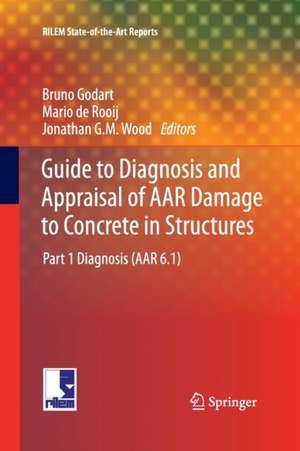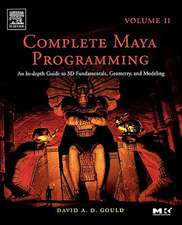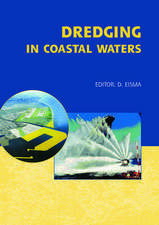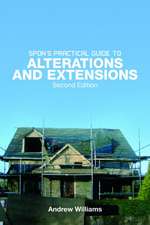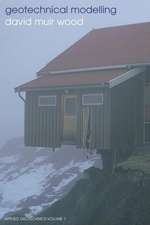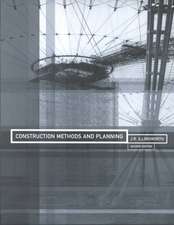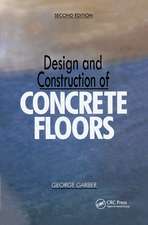Guide to Diagnosis and Appraisal of AAR Damage to Concrete in Structures: Part 1 Diagnosis (AAR 6.1): RILEM State-of-the-Art Reports, cartea 12
Editat de Bruno Godart, Mario de Rooij, Jonathan G.M. Wooden Limba Engleză Paperback – 22 mai 2015
Din seria RILEM State-of-the-Art Reports
- 15%
 Preț: 643.84 lei
Preț: 643.84 lei - 15%
 Preț: 659.20 lei
Preț: 659.20 lei - 15%
 Preț: 644.18 lei
Preț: 644.18 lei - 15%
 Preț: 637.59 lei
Preț: 637.59 lei - 18%
 Preț: 726.34 lei
Preț: 726.34 lei - 18%
 Preț: 947.50 lei
Preț: 947.50 lei - 20%
 Preț: 565.33 lei
Preț: 565.33 lei - 18%
 Preț: 788.54 lei
Preț: 788.54 lei - 18%
 Preț: 884.22 lei
Preț: 884.22 lei - 18%
 Preț: 953.65 lei
Preț: 953.65 lei - 18%
 Preț: 967.08 lei
Preț: 967.08 lei - 15%
 Preț: 640.06 lei
Preț: 640.06 lei - 18%
 Preț: 1227.99 lei
Preț: 1227.99 lei - 15%
 Preț: 644.95 lei
Preț: 644.95 lei - 15%
 Preț: 640.24 lei
Preț: 640.24 lei - 15%
 Preț: 637.46 lei
Preț: 637.46 lei - 20%
 Preț: 589.83 lei
Preț: 589.83 lei - 15%
 Preț: 634.68 lei
Preț: 634.68 lei - 18%
 Preț: 1114.02 lei
Preț: 1114.02 lei - 18%
 Preț: 1115.28 lei
Preț: 1115.28 lei - 18%
 Preț: 950.96 lei
Preț: 950.96 lei - 18%
 Preț: 1120.81 lei
Preț: 1120.81 lei - 18%
 Preț: 894.34 lei
Preț: 894.34 lei - 20%
 Preț: 554.91 lei
Preț: 554.91 lei - 15%
 Preț: 635.65 lei
Preț: 635.65 lei - 15%
 Preț: 713.02 lei
Preț: 713.02 lei - 15%
 Preț: 645.79 lei
Preț: 645.79 lei - 15%
 Preț: 583.78 lei
Preț: 583.78 lei - 15%
 Preț: 528.48 lei
Preț: 528.48 lei
Preț: 631.07 lei
Preț vechi: 742.43 lei
-15% Nou
Puncte Express: 947
Preț estimativ în valută:
120.78€ • 130.38$ • 101.28£
120.78€ • 130.38$ • 101.28£
Carte tipărită la comandă
Livrare economică 19 aprilie-03 mai
Preluare comenzi: 021 569.72.76
Specificații
ISBN-13: 9789400796263
ISBN-10: 9400796269
Pagini: 104
Ilustrații: X, 91 p. 28 illus.
Dimensiuni: 155 x 235 x 6 mm
Greutate: 0.16 kg
Ediția:2013
Editura: SPRINGER NETHERLANDS
Colecția Springer
Seria RILEM State-of-the-Art Reports
Locul publicării:Dordrecht, Netherlands
ISBN-10: 9400796269
Pagini: 104
Ilustrații: X, 91 p. 28 illus.
Dimensiuni: 155 x 235 x 6 mm
Greutate: 0.16 kg
Ediția:2013
Editura: SPRINGER NETHERLANDS
Colecția Springer
Seria RILEM State-of-the-Art Reports
Locul publicării:Dordrecht, Netherlands
Cuprins
1. Introduction: 1.1 Why the need for a diagnosis document.- 1.2 Scope.- 1.3 Definitions.- 2 Alkali-Aggregate Reaction: 2.1 Introduction.- 2.2 Alkali.- 2.3 Aggregates.- 2.4 Water.- 2.5 Pessimum behaviour.- 2.6 Summary.- 3 Symptoms of an expansive reaction during routine inspection: 3.1 General inspection remarks.- 3.2 Review of existing records.- 3.3 Planning of a comprehensive on-site inspection.- 3.4 The routine on-site inspection.- 3.5 Concrete surface features suggestive of AAR.- 3.6 First assessment of field observations.- 4 Confirmation investigation: 4.1 Introduction.- 4.2 Available methods, personnel and expertise.- 4.3 Approach for diagnosis of AAR in structures.- 4.4 On-site sampling for AAR confirmation.- 4.5 Visual examination of cores.- 4.6 Petrographic examination.- 4.7 Additional tests.- 5 Severity investigation: 5.1 Introduction.- 5.2 Field investigation.- 5.3 Laboratory tests.- 5.4 Summary of diagnosis.- 6 Reporting: 6.1 Purpose.- 6.2 Scope.- 6.3 Objectives of the investigation.- 6.4 Information concerning the structures.- 6.5 Methods and techniques used.- 6.6 Interpretation of results.- 6.7 Conclusions.- 6.8 Author.- References.- Appendix 1. Proceedings of ICAAR.- Appendix 2. Diagnosis of AAR within an overall investigation.
Textul de pe ultima copertă
This book describes procedures and methodologies used predominantly to obtain a diagnosis of damaged concrete possibly caused by Alkali-Aggregate Reaction (AAR). It has two primary objectives, namely firstly to identify the presence of AAR reaction, and whether or not the reaction is the primary or contributory cause of damage in the concrete; and secondly, to establish its intensity (severity) in various members of a structure. It includes aspects such as field inspection of the structure, sampling, petrographic examination of core samples, and supplementary tests and analyses on cores, such as mechanical tests and chemical analysis. Evaluation of test data for prognosis, consequences and appraisal will be more fully set out in AAR-6.2.
Caracteristici
Prepared by the foremost experts in the world Gives comprehensive guidance on the diagnosis of this form of damage Unique in its breadth and depth Part of a series which deals with all aspects of the diagnosis, care and maintenance of concrete structures affected by alkali-aggregate reactions
